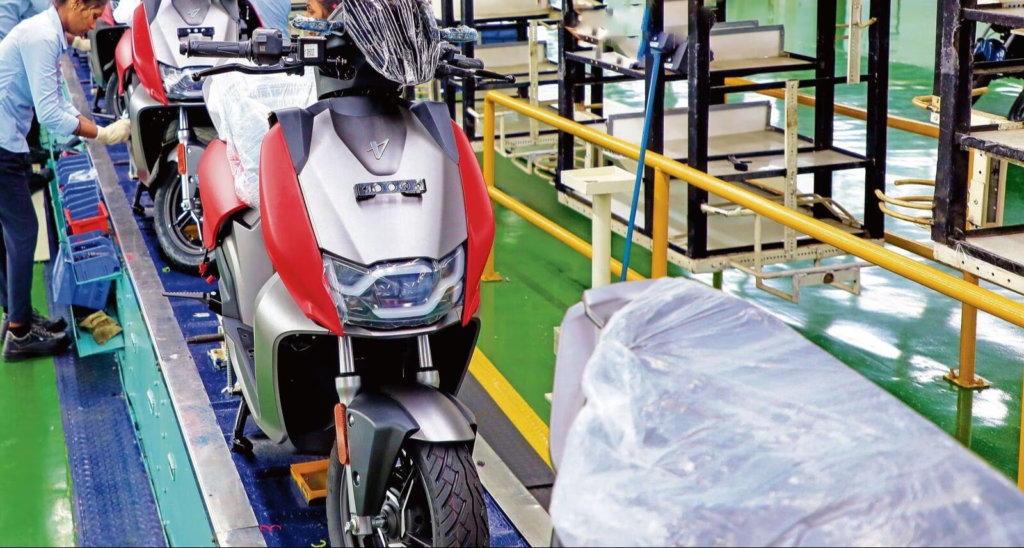White label electric scooters are scooters produced by one company but branded and sold by another. This approach allows businesses to offer their own branded electric scooters without having to develop and manufacture them from scratch. It can be a cost-effective way to enter the market with a product that’s already developed and tested.

Features
White label electric scooters can vary in features depending on the manufacturer and the specific model, but generally, they offer a range of common features. Here are some typical features you might find:
- Battery and Range: High-capacity batteries providing a range of 20-40 miles on a single charge, depending on the model and riding conditions.
- Motor Power: Motors typically range from 250W to 750W, with higher wattage providing more power and better performance on inclines.
- Speed: Maximum speeds usually range from 15 to 30 mph, depending on regulations and the scooter’s design.
- Brakes: Common types include disc brakes, drum brakes, and regenerative braking systems for better control and safety.
- Suspension: Front and/or rear suspension systems to provide a smoother ride and improve comfort on uneven surfaces.
- Lighting: LED headlights and taillights for better visibility and safety, especially in low-light conditions.
- Foldability: Many of these electric scooters are designed to be foldable for easy storage and portability.
- Display and Controls: Digital displays showing speed, battery level, and other key information, along with intuitive controls for operation.
- Tyres: Options may include solid tyres or pneumatic (air-filled) tyres, with pneumatic tyres offering better shock absorption and ride comfort.
- Connectivity: Some models come with Bluetooth or smartphone app integration for features like tracking, diagnostics, and customization.
- Build Quality: Durable frames made from materials like aluminum or steel, designed to withstand regular use.
- Weight Capacity: Usually able to support riders up to 220-265 lbs, depending on the scooter’s design.
- Additional Features: Features like cruise control, anti-theft alarms, or customizable LED lights may also be included, depending on the specific model and brand.
When selecting a white label electric scooter, it’s important to consider these features in relation to your target market and intended use.
Foundation
The foundation involves several key components:
- Manufacturing: The core of white label electric scooters is their manufacturing. This typically includes the design and production of the scooter’s components such as the frame, battery, motor, and electronics. Manufacturers are responsible for creating a high-quality product that meets safety and performance standards.
- Customization: While the base scooter is produced by the manufacturer, the white label aspect involves customizing the scooter with different branding elements. This can include custom colors, logos, and design features tailored to the branding company’s specifications.
- Compliance: Manufacturers ensure that the scooters comply with local regulations and safety standards. This is crucial for market acceptance and legal operation. Compliance can vary by region and may include certifications for battery safety, electrical standards, and vehicle safety.
- Quality Control: A rigorous quality control process is essential to ensure that each scooter meets the necessary performance and safety standards. This involves testing the scooters for durability, safety, and reliability before they are branded and shipped.
- Supply Chain Management: Efficient supply chain management is critical to handle the production, assembly, and distribution of the scooters. This includes sourcing materials, managing inventory, and coordinating logistics.
- Branding: The branding company takes the white label scooters and applies their own branding elements. This includes adding logos, custom paintwork, and unique design features to align the product with their brand identity.
- Marketing and Sales: The branding company is responsible for marketing and selling the white label electric scooters. This involves creating promotional materials, setting up sales channels, and reaching out to potential customers.
- Customer Support: Providing after-sales support is an important aspect of maintaining customer satisfaction. This includes offering warranties, handling repairs, and addressing customer inquiries.
By combining these elements, white label electric scooters offer a way for companies to enter the market with a branded product without having to handle the complex and costly aspects of manufacturing themselves.
Production
Several companies specialize in producing white label electric scooters. Some well-known manufacturers that offer white label options include:
- Segway-Ninebot: Known for a wide range of electric scooters and personal transportation devices, they offer white label solutions.
- Xiaomi: Xiaomi produces electric scooters that can be customized and branded for other companies.
- Inokim: This company offers white label options for their electric scooters.
- Unagi: Unagi provides white label services for their high-quality electric scooters.
- Swagtron: Known for a range of electric scooters, they also offer white label products.
Each of these companies has its own process for white labeling, so it’s a good idea to contact them directly to discuss your specific needs and branding requirements.
Branding
Branding is typically done by companies that want to sell scooters under their own name. Here’s a breakdown of the process:
- Retailers and Distributors: Companies that specialize in selling electric scooters may purchase white label models from manufacturers. They then add their own branding, such as logos and custom designs, to differentiate the product.
- Businesses and Startups: New businesses or startups looking to enter the electric scooter market might use white label scooters to quickly launch their own branded products without investing in R&D and manufacturing.
- Corporate Clients: Large corporations or fleet operators may use white label electric scooters to offer branded options for their employees, customers, or partners.
- Marketing and Licensing Agencies: Specialized agencies or companies that focus on branding and licensing may work with manufacturers to create and market white label scooters for various clients.
Essentially, any company looking to sell electric scooters under their own brand, without handling the manufacturing process themselves, can engage in white label branding.

Sales
Sales of white label electric scooters are typically handled by the company that brands the scooters, not the manufacturer. Here’s who is involved in the sales process:
- Retail Companies: Businesses that buy white label scooters and brand them as their own often sell them through their retail channels, including physical stores and online platforms.
- Distributors: Companies that specialize in distributing consumer products, including white label electric scooters, may handle the sales process, often working with various retailers and partners.
- E-commerce Platforms: Many companies selling white label scooters will use e-commerce platforms, either their own or third-party platforms like Amazon or Alibaba, to reach a broader customer base.
- Direct Sales Teams: Some companies may have dedicated sales teams that handle direct sales to consumers or businesses, often through their own websites or by partnering with other retailers.
- Corporate Partners: Businesses purchasing white label scooters for their own use or for promotional purposes may handle the sales internally, targeting their specific customer base or employee group.
In all these cases, the branding company, not the manufacturer, is responsible for the sales and marketing of the scooters.




